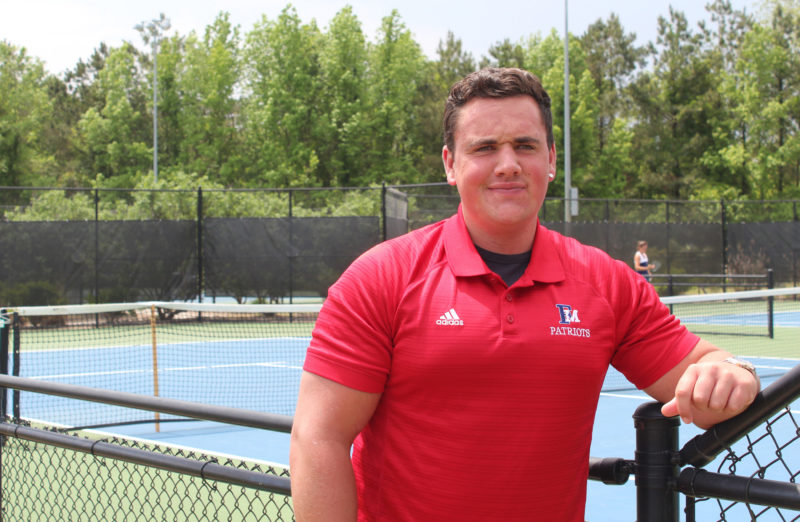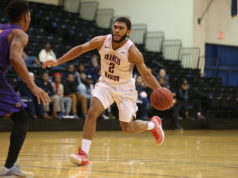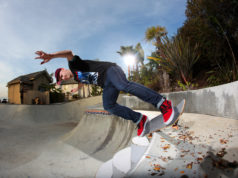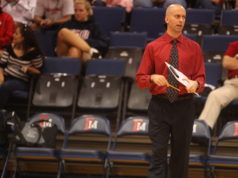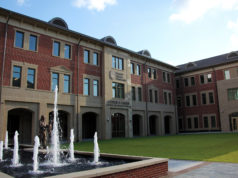A brain tumor cost FMU tennis player Luke Bateup most of his eyesight, but his vision has never been better
It all began, innocently enough, with a free eye exam.
Luke Bateup saw the ad in his local paper, thought it worth the trouble, and decided he’d drop by. Funny thing though, at the exam he could only see one letter – the great big one at the top of the chart – with his left eye. That was funny, as in funny strange, because Bateup used his eyes quite a bit as a student, and, especially, as a member of the Francis Marion University tennis team. How could he have failed to notice something like that?
It’s probably nothing, the examiners back in his native England said. Don’t worry.
Luke headed back to FMU in the fall of the 2014, ready to resume his studies and his work on the court. But during a routine sports physical – it’s standard procedure for all athletes — the eye thing popped up again. This time it was worse. He couldn’t see anything with his left eye.
A few small alarm bells went off. More extensive exams were performed, but there didn’t seem to be anything structurally wrong with the eye.
Local doctors sent him to see a neurologist who ordered up a scan of his brain.
Finally, there was an answer.
But not one Luke wanted to hear.
There was a mass in his brain, a tumor.
He dropped out of school in October and returned home. Exams there confirmed the problem, and, after a brief hassle with the National Health Service regarding the need for immediate surgery, Bateup went under the knife in early November.
It was a big operation, the first of three that would be needed to get him back on his feet, and the start of an ordeal that would test his courage and his determination.
‘Half vision’
Luke Bateup battled his way through multiple surgeries, a 35-day hospital stay, a bout of meningitis, a chest infection, and an allergic reaction to morphine. Doctors performed three surgeries to remove life-threatening tumor in his head. They were successful in reducing that threat, at least for the time being. But they couldn’t save his sight.
Bateup lost all vision in his left eye, where the tumor had severely compressed an optic nerve, and half the vision in his right.
If “half vision” sounds like an oddly precise description of an injury it is. But that’s how the doctors explained it to Bateup and that’s how he, literally, sees it.
“The vision in my right eye is actually quite good, 20-20,” says Bateup, “but it’s not all there. What I can see, I can see very well. But what I can’t see I can’t see at all.”
Needless to say, this has caused all kinds of problems, ranging from the traumatic to the trivial. He can’t drive a car and reading is a major chore because of his limited field of vision. Less serious, but still annoying, are social situations in which he can’t see hands extended in friendship or credit cards being returned by a server.
“People think I’m rude,” says Bateup. “Truth is, I just can’t see everything.”
Getting wiser
Bateup has worked his way around most of that. Nearly two years after the surgery, he has a better understanding of what he can and can’t see, and is able, in most cases, to put himself in position to avoid embarrassment. He’s figured out the reading, and its mirror activity, writing, too.
Well, to say his figured it out is to put too fine a point on things. Most of the “figuring” is just hard work over long hours. There’s no getting around the fact that he takes him longer to do academic work than it once did.
Of course, that was, and is, counter-balanced by the fact that now he wants to complete that work more than he ever did before, which is the biggest reason why he graduated from Francis Marion last May cum laude with a Business degree in Supply Chain Operations Management. It’s one of most arduous majors in the FMU School of Business, and a degree few thought Bateup would receive after his diagnosis two years before.
Barry O’Brien, recently retired at dean of FMU’s School of Business, says Bateup’s perseverance has been inspirational.
“What that kid has been through … you just can’t imagine,” says O’Brien. “I’ve never seen anything like it. What a great kid and student. Everybody has been rooting for him.”
Says Bateup, “I was told this would be very difficult and I’m sure there were a lot of people who thought I wouldn’t make it back, wouldn’t get the degree,” he says, “but I never thought that. I was always going to make it back.”
FMU’s administration and Bateup’s professors were, needless to say, accommodating when he had to leave and, again, when he returned. Bateup says many went well beyond that, however.
“Everyone at FMU has just been great,” Bateup said. “There were never any questions about me withdrawing from classes, or about having an opportunity to return. It just happened. Dean Barry O’Brien (of the FMU School of Business) was so helpful. My teachers, Dr (Mark) Blackwell, Dr. (Kay) Lowrimore, Dr. (Joe) Aniello) were all just brilliant. Dr. Blackwell sent me card after card. Dr. Lowrimore kept emailing me. They were great, they all were.”
Remarkably, even though he now reads much slower than before, Bateup was a better student his last year at FMU. Or perhaps that’s not so remarkable. Going through what he went through will change a person. Calamity can inspire maturity.
“It is odd,” says Bateup. “School suddenly became much more important to me after the surgery. I look back now and the biggest frustration is that I didn’t do more my first couple years (at FMU). I suppose you hear that fairly often from students who just grow up, get a little wiser. Well, I grew up. I know what’s important now.”
A lot of whiffs
Academics weren’t the only skill Bateup resurrected after his recovery.
He learned to play tennis again, too.
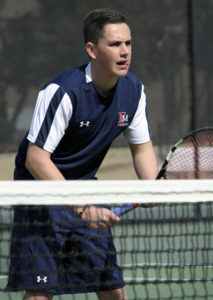
While the physicians who saw and treated him differed about his chances of regaining academic abilities and full brain function, there were unanimous with regard to his career on the court: it was over.
He certainly couldn’t play at his previous high competitive level, they told him, and most assumed he couldn’t play at all. Hand-eye coordination and all that, you know. Pretty hard to hit a moving ball with a half an eye. Sorry, mate.
Bateup heard all this and assumed it must be true. But one of his youth coaches in England, Craig Allen, thought otherwise. He saw Bateup walking on a treadmill, doing rehab, at the London gym and sportsplex where a young Luke had first learned tennis. It seemed like a waste to Allen.
“He came over and basically grabbed me and said, ‘Come on. We should be doing something so much more important,’” Bateup said. “We went over to the tennis court, got some rackets and balls, and we hit balls for about 90 minutes.”
Well, to be accurate, Allen hit balls. Bateup swung at them.
“Didn’t hit a one,” he said.
But, he didn’t feel like it was impossible. So, he began to training. Allen helped with aids, like a Velcro glove and ball, to help him re-learn hand-eye coordination. He worked with that for hours on end. As his skills began to come back, it was back to the court where he actually began to hit balls again. Other friends chipped in. He never lacked for partners or encouragement, and eventually, miraculously perhaps, he could play tennis again.
Today, Bateup is good enough to play actual tennis at, in his opinion, “a decent recreational level.” He’s good enough to serve as a volunteer coach in the FMU tennis program, good enough, even, to rally (hit balls) with his old FMU teammates … as long as they don’t move around too much.
“If I’m standing still I can hit it just fine, rally with the best of them,” says Bateup, “but finding and reacting to balls that change direction, I’m just a split second too slow and that makes all the difference.”
Bateup hopes tennis will play a part in his future. He still loves the game and enjoys playing as much as he can. Last summer he acquired his Level 2 coaching certificate from the Lawn Tennis Association of England, the necessary credential for teaching the sport. He had a summer job lined up, working as an assistant professional at club in the northeast, but further complications from his illness required that he return home for the summer.
Not a 160-pounder
Life is different now for Luke Bateup.
He only has a quarter of the sight he once had, can’t drive a car, and is on a serious regimen of assorted meds as he fights to keep the tumor from coming back.
While not excited about some of the side effects of his medications – thanks to steroids, the former 160-pounder is now among the most imposing good tennis players you’ll ever meet — Bateup says he’s adjusting to new daily routines. Getting dressed, taking meds, etc., has doubled the length of his morning preparations, and, as noted, he’s had to figure out new techniques to substitute for lost peripheral vision and other sight issues. But that’s no big deal, all things considered.
“I’ve adjusted and if you ask me now to tell you what full vision is like, I really can’t do that,” says Bateup. “I’m getting along. I’m really pretty lucky you know.”
He is looking to put his management degree to work – in the U.S. or in England. He’s also contemplating a return to FMU to pick up his masters.
“We’ll see how it turns out,” said Bateup. “You never know what the future holds.”
Words to live by.
Especially if you’re Luke Bateup.


